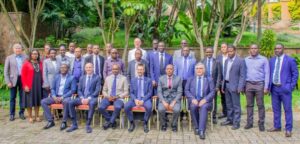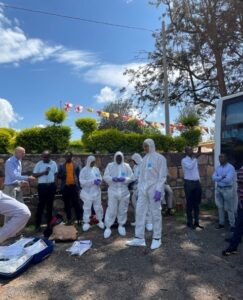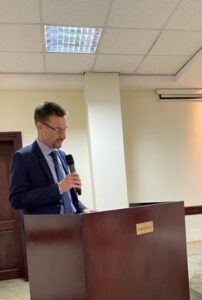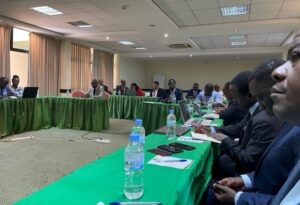 On 15 December 2022, the Rwanda capital Kigali hosted the closing session of the Steering Committee (SC) of the EU-funded, ISTC – implemented Project 60 “Support to the Centre of Excellence of Eastern and Central Africa in Nuclear Security”. During the preceding week, the final activity of Project 60 took place in Kigali – training in detection and identification of sources of radiation and retrieval of radioactive material, involving experts from the nuclear regulators in Rwanda, Burundi, and Uganda. SC members observed the conduct of the closing field exercise, a simulated border crossing checking, organized by the external advisors from ENCO and SCK-CEN, and supported technically by the Rwanda Utilities Regulatory Authorities (RURA).
On 15 December 2022, the Rwanda capital Kigali hosted the closing session of the Steering Committee (SC) of the EU-funded, ISTC – implemented Project 60 “Support to the Centre of Excellence of Eastern and Central Africa in Nuclear Security”. During the preceding week, the final activity of Project 60 took place in Kigali – training in detection and identification of sources of radiation and retrieval of radioactive material, involving experts from the nuclear regulators in Rwanda, Burundi, and Uganda. SC members observed the conduct of the closing field exercise, a simulated border crossing checking, organized by the external advisors from ENCO and SCK-CEN, and supported technically by the Rwanda Utilities Regulatory Authorities (RURA).
The final session of P-60 Steering Committee was open by Pascal Munyagabe, Director of Foreign Military Relations and Defense Liaison at the Ministry of Defense. It was attended by the national focal points and other experts from Burundi, Ghana, Ethiopia, Kenya, Malawi, Seychelles, Rwanda, Uganda, Zambia, and representatives from the Center of Excellence in East and Central Africa (CoE ECA), including its outgoing Chairman Joseph Maina.

In his remarks Ben Nupnau, Deputy Head of the EU Delegation praised the Project as a vehicle for transfer of European experience to African partners. Francis Luc, Director for African Affairs at the MFA, also praised the outputs from the Project as significant and commendable. The Project helped participating countries establish inspection procedures and emergency plans, and, through numerous courses and exercises, get better prepared to prevent illicit trafficking of radioactive material.
Bojan Tomic, CEO, ENCO presented a retrospective analysis of the project achievements in the various working packages under the project. He provided information on topics like: preparation of nuclear security regulations and guides; improvement of RN inventories; assessment of national capabilities and recommendations on secure management of (six) radioactive storages; development of strategies and action plans for control over disused, orphan sources; introduction of national emergency response plans for RN incidents; certification of equipment for security inspections; dissemination of nuclear security knowledge/security culture for regulatory staff, license holders, customs, border guards, etc. Throughout the project thirty-four workshops and training events were conducted for 807 people from eleven participating states.
 In terms of sustainability of the results special attention was paid to the Train-the-Trainers (TTT) courses that – in addition to presentations on nuclear security themes – comprised practical exercises, measurements; visits to facilities to learn about the design of security systems and evaluate their effectiveness. Two TTT courses were organized in Kenya and in Tanzania in 2019, with forty-three participants from multiple countries. Three refresher TTT courses took place online in April 2022 involving thirty-two regulatory body staff, seventeen customs officers, and forty-seven licensees and operators. To prevent illicit trafficking the establishment of Mobile Expert Support Teams (MEST) was recommended to assist the front-line officers in detection and investigation. Four training courses were dedicated to MEST and their assistance to customs and border guards.
In terms of sustainability of the results special attention was paid to the Train-the-Trainers (TTT) courses that – in addition to presentations on nuclear security themes – comprised practical exercises, measurements; visits to facilities to learn about the design of security systems and evaluate their effectiveness. Two TTT courses were organized in Kenya and in Tanzania in 2019, with forty-three participants from multiple countries. Three refresher TTT courses took place online in April 2022 involving thirty-two regulatory body staff, seventeen customs officers, and forty-seven licensees and operators. To prevent illicit trafficking the establishment of Mobile Expert Support Teams (MEST) was recommended to assist the front-line officers in detection and investigation. Four training courses were dedicated to MEST and their assistance to customs and border guards.
ISTC presented the main events where Project 60 activities and singled out key partnerships with regional and international organizations that helped spread the word about the project, its objectives, and outcomes. These results were achieved at various levels – from policy and legislation to public awareness and youth engagement in all areas related to nuclear safety and security.
Advocacy and outreach activities included: 4 side events to IAEA General Conferences and International Conferences, notably the side events at the IAEA GC63 and the IAEA GC66, where P-60 featured as a flagship project of the EU in East and Central Africa; cooperation with the African Commission on Nuclear Energy (AFCONE); highlighting P-60 as a good example of intra- and inter-regional cooperation, notably as demonstrated by the Tabletop Exercise “Sunkar”; support to the African Young Generation in Nuclear (AYGN) and its national chapters. 400+ African high school and university students took part in activities supported by Project 60 and the ISTC in Kenya, Zambia, and Ghana.
 The SC members from the participating African states expressed their favorable impression from Project 60 and satisfaction from the contribution it made to the strengthening of the nuclear governance of their countries. For example, Project 60 contribution to people’s capacity development is included in the last National Report of the Government of Zambia to the United Nations on the country’s implementation of the UN Security Council Resolution 1540. Apart from sharing their national perspectives, the African representatives also discussed the necessary steps ahead to ensure sustainability of the results after the completion of Project 60, and the necessity to address areas of interest that grew in importance since the time when P-60 was designed, such as cybersecurity and regional cooperation in nuclear security.
The SC members from the participating African states expressed their favorable impression from Project 60 and satisfaction from the contribution it made to the strengthening of the nuclear governance of their countries. For example, Project 60 contribution to people’s capacity development is included in the last National Report of the Government of Zambia to the United Nations on the country’s implementation of the UN Security Council Resolution 1540. Apart from sharing their national perspectives, the African representatives also discussed the necessary steps ahead to ensure sustainability of the results after the completion of Project 60, and the necessity to address areas of interest that grew in importance since the time when P-60 was designed, such as cybersecurity and regional cooperation in nuclear security.

